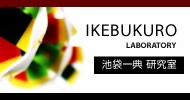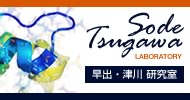Team:Tokyo-NoKoGen
From 2012.igem.org
(Difference between revisions)
| (4 intermediate revisions not shown) | |||
| Line 9: | Line 9: | ||
<!- ここから本文 -!> | <!- ここから本文 -!> | ||
| - | <H2>welcome to our team wiki!</H2> | + | <div align="center"><H2><font size="27">welcome to our team wiki!</font></H2></div> |
| Line 42: | Line 42: | ||
s</B></FONT> | s</B></FONT> | ||
</div> | </div> | ||
| - | + | <BR> | |
<div align="center"><img src="https://static.igem.org/mediawiki/2012/6/6a/Run_communicheria.gif" width="700" height="70"</img></div> | <div align="center"><img src="https://static.igem.org/mediawiki/2012/6/6a/Run_communicheria.gif" width="700" height="70"</img></div> | ||
| Line 57: | Line 57: | ||
<BR> | <BR> | ||
| - | + | ※We are sorry, but, if you use Internet Explorer (by Microsoft), this wiki sometimes won't work correctly. | |
</html> | </html> | ||
{{Template:Team:Tokyo-NoKoGen/contents_footer}} | {{Template:Team:Tokyo-NoKoGen/contents_footer}} | ||
Latest revision as of 03:08, 27 September 2012
welcome to our team wiki!
C
o
l
i
e
x
p
r
e
s
s

We created an E. coli for long distance communication. This “Communicheria coli” was inspired by the Pony Express, a rapid mail delivery service in the American Wild West, where mail was relayed by horseback riders. Communicheria coli sends a message, in the form of light, to distant cells, which then relay the message to other distant cells. Communicheria coli has light sensors constructed using the light receptor domain of bacterial sensory rhodopsin or the cyanobacterial green light sensor CcaS. In response to light signals, cells will induce their own lux operon to send the message to other distant cells, for example in a separate flask, which will in turn relay the message to other distant cells. To improve the effectiveness of our new signal delivery system, we set out to enhance the light intensity, change the light color, and shorten the response time.
※We are sorry, but, if you use Internet Explorer (by Microsoft), this wiki sometimes won't work correctly.
 "
"






